鲁教版(五四制)七年级上册Unit 6 How often do you exercise? Section A 1a~2d课件(共22张PPT)
文档属性
| 名称 | 鲁教版(五四制)七年级上册Unit 6 How often do you exercise? Section A 1a~2d课件(共22张PPT) |
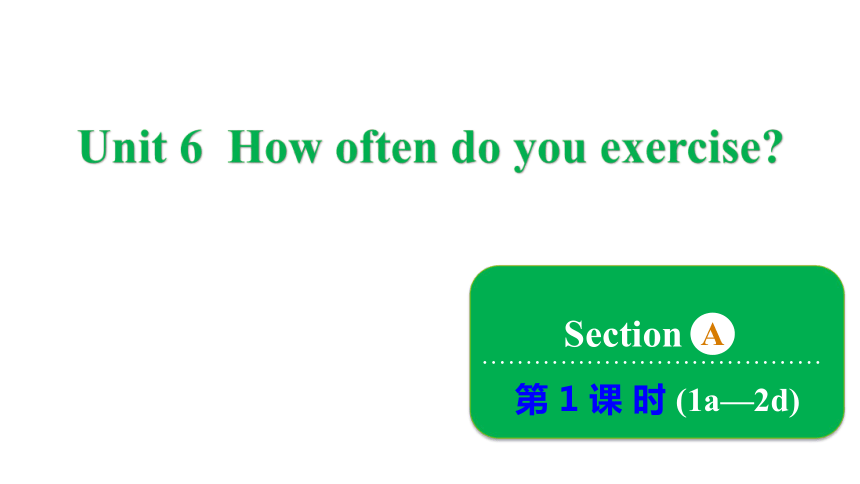
|
|
| 格式 | pptx | ||
| 文件大小 | 1.7MB | ||
| 资源类型 | 教案 | ||
| 版本资源 | 鲁教版 | ||
| 科目 | 英语 | ||
| 更新时间 | 2024-05-03 00:00:00 | ||
图片预览

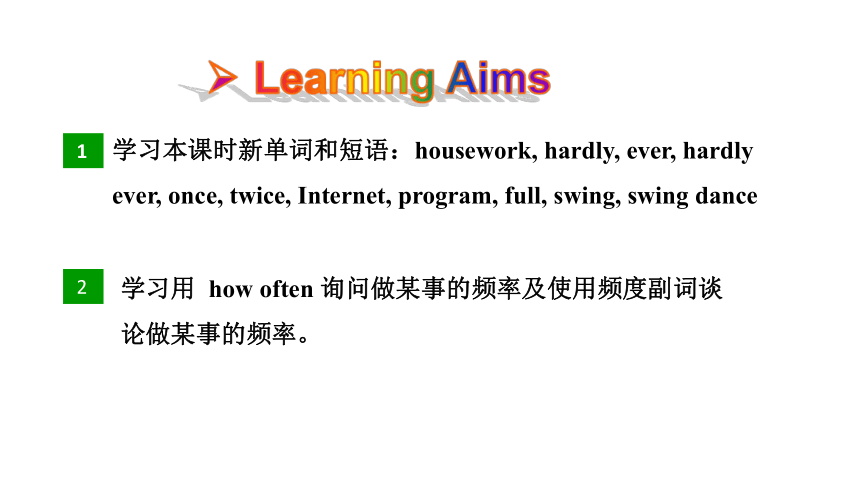

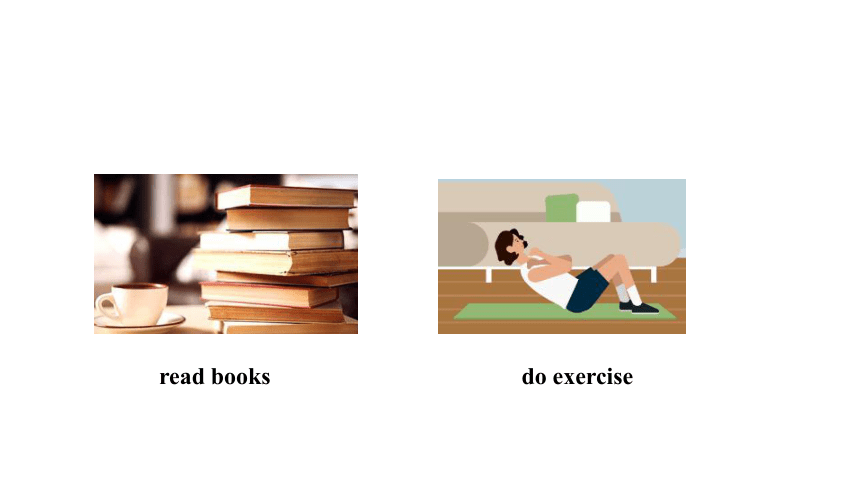

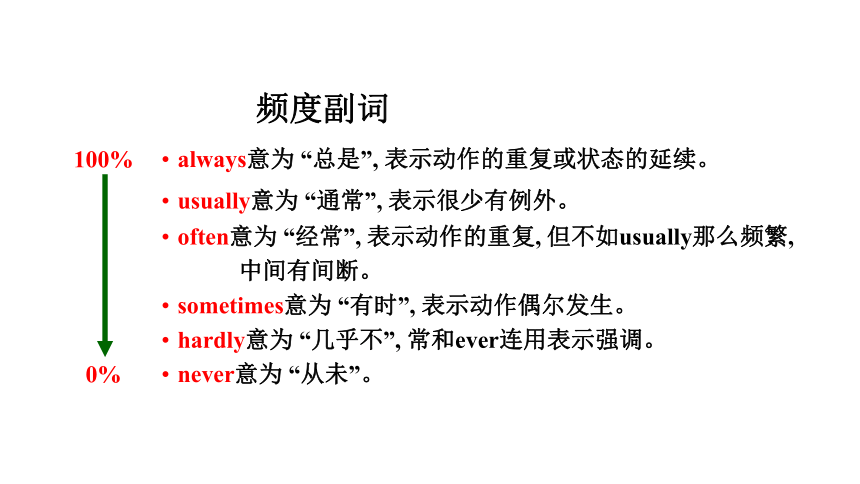
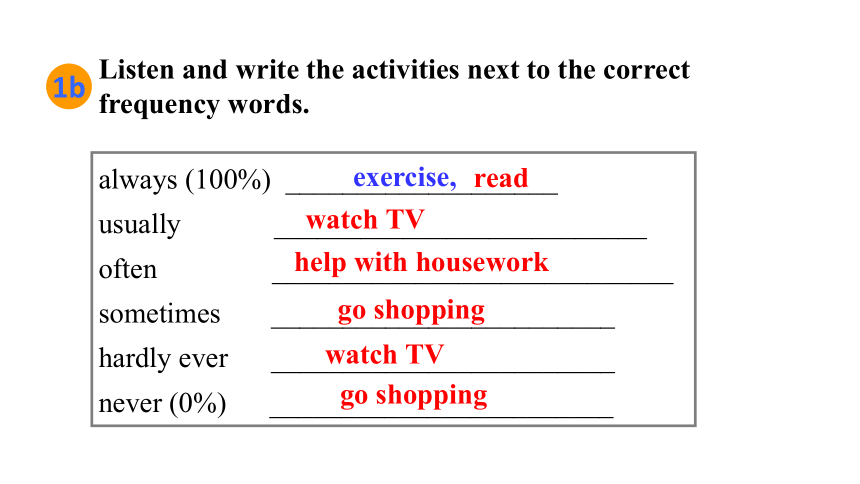
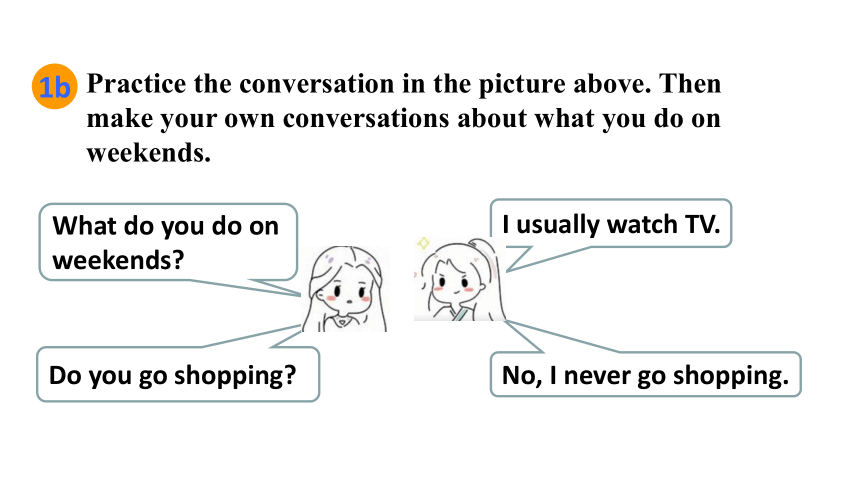

文档简介
(共22张PPT)
Section
Unit 6 How often do you exercise
第 1 课 时 (1a—2d)
…………………………………
A
1
2
Learning Aims
学习本课时新单词和短语:housework, hardly, ever, hardly ever, once, twice, Internet, program, full, swing, swing dance
学习用 how often 询问做某事的频率及使用频度副词谈论做某事的频率。
What do you usually do on weekends
Warming-up
watch TV help with housework
read books do exercise
Look at the picture. Make a list of the weekend activities.
What do you usually
do on weekends
I often go to
the movies.
a
b
c
d
e
1. ___________________
2. __________ 4. ____________
3. ____________ 5. ____________
help with housework
watch TV
read a book
exercise
go shopping
1a
always意为 “总是”, 表示动作的重复或状态的延续。
usually意为 “通常”, 表示很少有例外。
often意为 “经常”, 表示动作的重复, 但不如usually那么频繁,
中间有间断。
sometimes意为 “有时”, 表示动作偶尔发生。
hardly意为 “几乎不”, 常和ever连用表示强调。
never意为 “从未”。
频度副词
100%
0%
always (100%) ___________________
usually __________________________
often ____________________________
sometimes ________________________
hardly ever ________________________
never (0%) ________________________
Listen and write the activities next to the correct frequency words.
exercise,
read
watch TV
help with housework
go shopping
watch TV
go shopping
1b
Practice the conversation in the picture above. Then make your own conversations about what you do on weekends.
What do you do on weekends
I usually watch TV.
Do you go shopping
No, I never go shopping.
1b
What does she do on weekends
She …
Does she go to cinema
Yes, …
Pair work
What does he do on weekends
He …
Does he use the Internet
No, …
What do they do on weekends
They often…
Activities How often
a. ___go to the movies every day b. ___watch TV once a week c. ___shop twice a week d. ___exercise three times a week e. ___read once a month twice a month
Listen. Cheng Tao is talking about how often he does these activities. Number the activities [1-5] in the order you hear them.
1
3
5
4
2
2a
Activities How often
a. ___go to the movies every day b. ___watch TV once a week c. ___shop twice a week d. ___exercise three times a week e. ___read once a month twice a month
1
3
5
4
2
2b
Listen again. Match the activities in 2a with how often Cheng Tao does them.
How often do you do these activities
Fill in the chart and then make conversations.
Activities How often
watch TV every day
use the Internet
read English books
go to the movies
exercise
2c
four times a week
twice a week
every day
once a month
2c
A: How often do you watch TV
B: I watch TV every day.
A: What’s your favorite program
B: Animal world.
A: How often do you watch it
B: Twice a week.
Pair work
A: What are they doing
B: They are dancing.
A: What kind of dance are they dancing
B: Swing dance.
Read the conversation and match the activities with the right time.
piano lesson
dance lesson
play tennis
Wednesday and Friday
Tuesday
Monday
Read
2d
Language points
1. What do you usually do on weekends?你通常在周末做什么?
(1) 本句是 what 引导的特殊疑问句,结构为“What do/does+主语+usually+实义动词?”,用以询问某人通常做的事情。
【例】 —What does she usually do after school?她放学后通常做什么?
—She often surfs the Internet. 她经常上网。
(2) on weekends 意为“在周末”,相当于 at weekends。
【例】 I usually get up late on weekends. 周末我通常很晚起床。
2. How often do you watch TV?你多久看一次电视?
本句是 how often 引导的特殊疑问句,结构为“How often + do/ does +主语+实义动词?”。how often 意为“多久一次”,针对频率进行提问。
一、汉译英
Exercises
1. 去看电影 _________________
2. 运动 _________________
3. 看电视 _________________
4. 读英语书 _________________
5. 上网 _________________
6. 购物 _________________
7. 一个月两次 ________________
go to the movies
watch TV
read English books
exercise
use the Internet
shop
twice a month
二、根据句意,用括号中所给单词的适当形式填空。
1.Tim goes to the library twice (two) a week.
2.Most students in our school go home four times (time) a year.
3.His grandpa usually walks (walk) in the park after dinner.
4.I can't go out now, because I have to finish (finish) the homework first.
Homework
1. Role-play the conversation in 2d.
2. Making sentences with the frequency words.
Section
Unit 6 How often do you exercise
第 1 课 时 (1a—2d)
…………………………………
A
1
2
Learning Aims
学习本课时新单词和短语:housework, hardly, ever, hardly ever, once, twice, Internet, program, full, swing, swing dance
学习用 how often 询问做某事的频率及使用频度副词谈论做某事的频率。
What do you usually do on weekends
Warming-up
watch TV help with housework
read books do exercise
Look at the picture. Make a list of the weekend activities.
What do you usually
do on weekends
I often go to
the movies.
a
b
c
d
e
1. ___________________
2. __________ 4. ____________
3. ____________ 5. ____________
help with housework
watch TV
read a book
exercise
go shopping
1a
always意为 “总是”, 表示动作的重复或状态的延续。
usually意为 “通常”, 表示很少有例外。
often意为 “经常”, 表示动作的重复, 但不如usually那么频繁,
中间有间断。
sometimes意为 “有时”, 表示动作偶尔发生。
hardly意为 “几乎不”, 常和ever连用表示强调。
never意为 “从未”。
频度副词
100%
0%
always (100%) ___________________
usually __________________________
often ____________________________
sometimes ________________________
hardly ever ________________________
never (0%) ________________________
Listen and write the activities next to the correct frequency words.
exercise,
read
watch TV
help with housework
go shopping
watch TV
go shopping
1b
Practice the conversation in the picture above. Then make your own conversations about what you do on weekends.
What do you do on weekends
I usually watch TV.
Do you go shopping
No, I never go shopping.
1b
What does she do on weekends
She …
Does she go to cinema
Yes, …
Pair work
What does he do on weekends
He …
Does he use the Internet
No, …
What do they do on weekends
They often…
Activities How often
a. ___go to the movies every day b. ___watch TV once a week c. ___shop twice a week d. ___exercise three times a week e. ___read once a month twice a month
Listen. Cheng Tao is talking about how often he does these activities. Number the activities [1-5] in the order you hear them.
1
3
5
4
2
2a
Activities How often
a. ___go to the movies every day b. ___watch TV once a week c. ___shop twice a week d. ___exercise three times a week e. ___read once a month twice a month
1
3
5
4
2
2b
Listen again. Match the activities in 2a with how often Cheng Tao does them.
How often do you do these activities
Fill in the chart and then make conversations.
Activities How often
watch TV every day
use the Internet
read English books
go to the movies
exercise
2c
four times a week
twice a week
every day
once a month
2c
A: How often do you watch TV
B: I watch TV every day.
A: What’s your favorite program
B: Animal world.
A: How often do you watch it
B: Twice a week.
Pair work
A: What are they doing
B: They are dancing.
A: What kind of dance are they dancing
B: Swing dance.
Read the conversation and match the activities with the right time.
piano lesson
dance lesson
play tennis
Wednesday and Friday
Tuesday
Monday
Read
2d
Language points
1. What do you usually do on weekends?你通常在周末做什么?
(1) 本句是 what 引导的特殊疑问句,结构为“What do/does+主语+usually+实义动词?”,用以询问某人通常做的事情。
【例】 —What does she usually do after school?她放学后通常做什么?
—She often surfs the Internet. 她经常上网。
(2) on weekends 意为“在周末”,相当于 at weekends。
【例】 I usually get up late on weekends. 周末我通常很晚起床。
2. How often do you watch TV?你多久看一次电视?
本句是 how often 引导的特殊疑问句,结构为“How often + do/ does +主语+实义动词?”。how often 意为“多久一次”,针对频率进行提问。
一、汉译英
Exercises
1. 去看电影 _________________
2. 运动 _________________
3. 看电视 _________________
4. 读英语书 _________________
5. 上网 _________________
6. 购物 _________________
7. 一个月两次 ________________
go to the movies
watch TV
read English books
exercise
use the Internet
shop
twice a month
二、根据句意,用括号中所给单词的适当形式填空。
1.Tim goes to the library twice (two) a week.
2.Most students in our school go home four times (time) a year.
3.His grandpa usually walks (walk) in the park after dinner.
4.I can't go out now, because I have to finish (finish) the homework first.
Homework
1. Role-play the conversation in 2d.
2. Making sentences with the frequency words.
同课章节目录
- Unit 1 What does he look like?
- Section A
- Section B
- Unit 2 I'd like some noodles.
- Section A
- Section B
- Unit 3 How was your school trip?
- Section A
- Section B
- Unit 4 What did you do last weekend?
- Section A
- Section B
- Unit 5 Where did you go on vacation?
- Section A
- Section B
- Unit 6 How often do you exercise?
- Section A
- Section B
- Unit 7 I'm more outgoing than my sister.
- Section A
- Section B
- Unit 8 What's the best movie theater?
- Section A
- Section B
